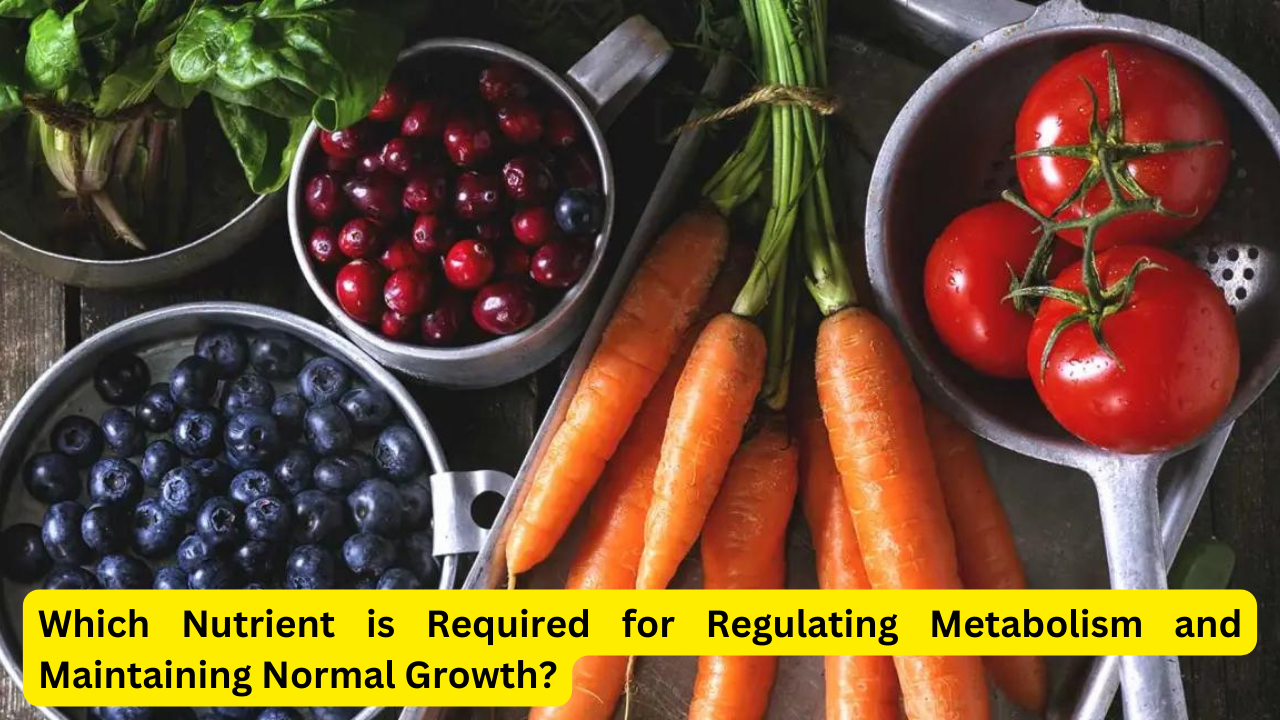Which Nutrient is Required for Regulating Metabolism and Maintaining Normal Growth?

Which Nutrient is Required for Regulating Metabolism and Maintaining Normal Growth?. In the ever-evolving field of nutrition, understanding which nutrient is required for regulating metabolism and maintaining normal growth is crucial for achieving optimal health and wellness. As scientific research advances, we gain deeper insights into how different nutrients affect our body’s metabolism and growth. This article delves into the vital nutrient that plays a central role in these processes, highlighting recent research findings and their implications for dietary recommendations.
The Essential Role of Vitamin B Complex in Metabolism and Growth
Vitamin B1 (Thiamine)
Vitamin B1, commonly known as thiamine, is integral to carbohydrate metabolism. It helps convert carbohydrates into energy by facilitating the enzymatic reactions in the Krebs cycle. This process is essential for producing ATP (adenosine triphosphate), the primary energy carrier in cells. Thiamine also supports nerve function, which indirectly influences metabolism by ensuring that energy production is efficient.
Vitamin B2 (Riboflavin)
Riboflavin is another crucial player in the metabolic process. It aids in the breakdown of fats, proteins, and carbohydrates, converting them into usable energy. Additionally, riboflavin is involved in the antioxidant defense system, protecting cells from oxidative stress, which can otherwise impair metabolic functions.
Vitamin B3 (Niacin)
Niacin (Vitamin B3) plays a significant role in energy metabolism by participating in redox reactions as a coenzyme (NAD and NADP). It supports the metabolism of carbohydrates, fats, and proteins, facilitating the production of energy. Niacin also contributes to maintaining healthy skin, nerves, and digestion.
Vitamin B5 (Pantothenic Acid)
Pantothenic acid is essential for synthesizing coenzyme A, which is involved in fatty acid metabolism and energy production. This vitamin supports the synthesis of hormones and neurotransmitters, contributing to overall growth and development.
Vitamin B6 (Pyridoxine)
Pyridoxine (Vitamin B6) is vital for amino acid metabolism and the synthesis of neurotransmitters. It plays a crucial role in protein metabolism, which is essential for muscle growth and repair. Additionally, Vitamin B6 supports cognitive development and function.
Vitamin B7 (Biotin)
Biotin is well-known for its role in enhancing the metabolism of fats, proteins, and carbohydrates. It acts as a coenzyme in various biochemical reactions, contributing to the maintenance of healthy hair, skin, and nails, and supporting normal growth.
Vitamin B9 (Folate)
Folate (Vitamin B9) is essential for DNA synthesis and repair, making it critical for cell growth and division. It is particularly important during periods of rapid growth, such as pregnancy and infancy. Folate also helps in the formation of red blood cells, which are necessary for transporting oxygen throughout the body.
Vitamin B12 (Cobalamin)
Cobalamin (Vitamin B12) is crucial for maintaining healthy nerve cells and producing DNA and RNA. It also aids in the formation of red blood cells and supports overall brain health. Vitamin B12 is essential for proper metabolism of fats and proteins, thereby playing a key role in regulating metabolism.
The Intersection of Vitamins and the Gut Microbiome
Recent research highlights the interaction between dietary nutrients and the gut microbiome in regulating metabolism and maintaining normal growth. The gut microbiome plays a significant role in nutrient absorption and metabolism, influencing how efficiently nutrients are utilized in the body.
Impact of Gut Microbiome on Nutrient Metabolism
A balanced gut microbiome can enhance the bioavailability of essential nutrients, including those in the B vitamin complex. For instance, certain gut bacteria produce biotin and folate, which are then utilized by the host. Disruptions in the gut microbiome can lead to deficiencies in these crucial nutrients, impacting metabolic processes and growth.
Dietary Interventions and Microbiome Health
Emerging dietary interventions focus on modulating the gut microbiome to improve nutrient absorption and metabolic health. High-fiber diets, prebiotics, and probiotics are being studied for their potential to support a healthy microbiome, thereby enhancing nutrient metabolism and overall well-being.
Emerging Dietary Patterns and Their Impact on Metabolism
Moderate-to-High Fat Diets
Recent dietary trends emphasize moderate-to-high fat intake, particularly focusing on healthy fats such as those from avocados, nuts, and olive oil. These dietary patterns can influence metabolism by altering the way the body processes fats and carbohydrates. Understanding how these diets interact with nutrient metabolism is crucial for developing effective dietary guidelines.
Timing of Eating
Another emerging trend is the emphasis on eating timing rather than just macronutrient composition. Time-restricted eating patterns and intermittent fasting have been shown to impact metabolic rate and energy balance. These eating patterns can influence how nutrients are processed and utilized, potentially affecting growth and overall health.
Pharmaceutical Interventions and Nutrient Metabolism
Pharmacological Advances
Pharmaceutical interventions are being explored to manage metabolic disorders and support normal growth. Drugs that modulate metabolic pathways or mimic the effects of certain nutrients are being investigated for their potential to enhance nutrient utilization and metabolic health.
Interactions with Nutritional Supplements
Nutritional supplements can also play a role in supporting metabolism and growth. Supplements of B vitamins, for instance, are often used to address deficiencies and support metabolic functions. However, the effectiveness of these supplements can be influenced by individual health conditions and interactions with medications.
Conclusion
In summary, the nutrient required for regulating metabolism and maintaining normal growth encompasses the Vitamin B complex and its crucial roles in energy production, cell function, and overall health. Advances in molecular nutrition and our understanding of the gut microbiome are providing new insights into how dietary patterns and interventions can optimize nutrient metabolism and support growth.
As research continues to evolve, it promises more precise dietary recommendations that leverage our growing knowledge of the microbiome and molecular biology. Staying informed about these developments can help individuals make better dietary choices to support their health and well-being.




